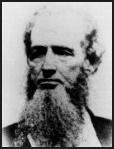Samuel J. Gholson
| Samuel Jameson Gholson | |
|---|---|
 Samuel J. Gholson | |
| Born |
May 19, 1808 Richmond, Kentucky |
| Died |
October 16, 1883 (aged 75) Aberdeen, Mississippi |
| Place of burial | Odd Fellows Rest Cemetery, Aberdeen, Mississippi |
| Allegiance | Confederate States of America |
| Service/branch | Confederate States Army |
| Years of service | 1861–1865 |
| Rank |
|
| Unit | Army of Tennessee |
| Commands held | Gholson's Brigade (cavalry) |
| Battles/wars |
|
| Other work | Attorney, judge, U.S. Congressman |
Samuel Jameson Gholson (May 19, 1808 – October 16, 1883) was a U.S. Representative from Mississippi, as well as a Confederate general during the American Civil War. He also served as a United States federal judge and a multiple-term member of the Mississippi House of Representatives.
Early life and career
Born near Richmond, Kentucky, Gholson moved with his father to Franklin County, Alabama, in 1817. He attended the common schools and later read law. He was admitted to the bar at Russellville, Alabama, in 1829. He moved to Athens, Mississippi, and commenced the practice of law in 1830. He served as member of the state House of Representatives in 1835, 1836, and 1839.
Gholson was elected as a Jacksonian Democrat to the Twenty-fourth U.S. Congress to fill the vacancy caused by the death of David Dickson and served from December 1, 1836, to March 3, 1837. His often stormy tenure was marked by a severe dispute with Henry A. Wise of Virginia that nearly resulted in a duel. Gholson presented credentials as a Democratic member-elect to the Twenty-fifth Congress and served from July 18, 1837, until February 5, 1838, when the seat was declared vacant. He was later replaced by Thomas J. Word.[1]
On February 9, 1839, Gholson was nominated by President Martin Van Buren to a jointly-held seat on both the Northern and Southern Districts of Mississippi, both vacated by the resignation of George Adams. Gholson was confirmed by the United States Senate on February 13, 1839, and received his commission the same day. While on the bench, he was a Lieutenant in the Mississippi State Militia in 1846. He served on the bench until his resignation on January 10, 1861, when Mississippi seceded from the Union. A fiery advocate of states' rights, he served as member of the state secession convention in 1861 and voted for the ordinance of secession.
Civil War service
With the subsequent outbreak of war, Gholson enlisted as a private in the Monroe Volunteers of Monroe County, Mississippi, (which became Company I, 14th Mississippi Infantry). He served from 1861 until 1863 in the state troops, rising successively through the ranks to captain, colonel, and then to brigadier general. During the Battle of Fort Donelson in Tennessee, he was badly wounded by a bullet that passed through his right lung. He was among the thousands of troops who were surrendered to the Union forces under Ulysses S. Grant. After his exchange, Gholson returned to active duty and fought at Iuka and then at Corinth, both in Mississippi.
By mid-1863, Gholson held the rank of major general of Mississippi State Troops. He was awarded the grade of brigadier general in the Provisional Army of the Confederate States to rank from May 6, 1864. He was placed in command of a brigade of cavalry attached to the division of Brig. Gen. James Chalmers under Maj. Gen. Nathan B. Forrest. While serving in the Department of Mississippi and East Louisiana, Gholson was severely wounded in a fight with Union cavalry on December 27, 1864, at Egypt, Mississippi. His left arm had to be amputated, ending his combat duty for the duration of the war.
Postbellum career
After the war, Gholson was again a member of the Mississippi House of Representatives in 1865, 1866, and 1878, serving as Speaker of the House from 1865–67. He opposed the government's controversial Reconstruction policies, a political move that eventually cost him his position. After leaving the state legislature, he continued the practice of law in Aberdeen, Mississippi.
Samuel J. Gholson died in Aberdeen on October 16, 1883, and was interred in the town's Odd Fellows Cemetery.[2]
See also
Notes
- ↑ Congressional biography
- ↑ Find A Grave biography of Cholson
References
- Eicher, John H., and David J. Eicher, Civil War High Commands. Stanford: Stanford University Press, 2001. ISBN 978-0-8047-3641-1.
- Find A Grave biography of Cholson
- Sifakis, Stewart. Who Was Who in the Civil War. New York: Facts On File, 1988. ISBN 978-0-8160-1055-4.
- United States Congress. "Samuel J. Gholson (id: G000149)". Biographical Directory of the United States Congress. Retrieved on 2008-02-13
- Warner, Ezra J. Generals in Gray: Lives of the Confederate Commanders. Baton Rouge: Louisiana State University Press, 1959. ISBN 978-0-8071-0823-9.
| Legal offices | ||
|---|---|---|
| Preceded by George Adams |
Judge of the United States District Court for the Northern District of Mississippi 1839–1861 |
Succeeded by Robert Andrews Hill |
| Preceded by George Adams |
Judge of the United States District Court for the Southern District of Mississippi 1839–1861 |
Succeeded by Robert Andrews Hill |
| United States House of Representatives | ||
| Preceded by David Dickson |
Member of the U.S. House of Representatives from Mississippi's at-large congressional district December 1, 1836 – March 3, 1837 |
Succeeded by Vacant |
| Preceded by Vacant |
Member of the U.S. House of Representatives from Mississippi's at-large congressional district July 18, 1837 – February 5, 1838 |
Succeeded by Vacant |